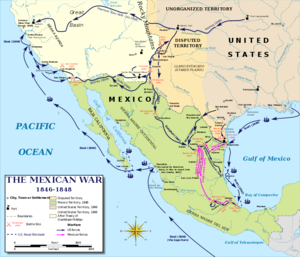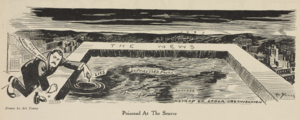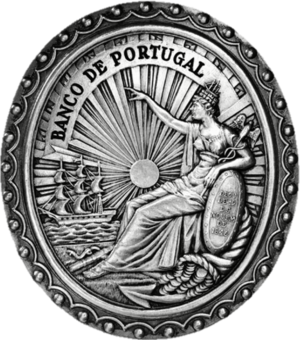Many thanks to our Patrons who cover ~2/3 of our hosting bill. Please join them if you can.
1846
Jump to navigation
Jump to search
1836 < 1837 < 1838 < 1839 < 1840 < 1841 < 1842 <1843 < 1844 < 1845 < 1846 > 1847 > 1848 > 1849 > 1850 > 1851 > 1852 > 1853 > 1854 > 1855 > 1856
 The Mexican–American War begins with a "border incident", in what Congressman Abraham Lincoln called "a bold falsification of history." | |
| year 1846 |
Events
- January 5 – The United States House of Representatives votes to stop sharing the Oregon Country with the United Kingdom.
- February 19 – United States president James K. Polk's annexation of the Republic of Texas is finalized by Texas president Anson Jones in a formal ceremony of transfer of sovereignty. The newly formed Texas state government is officially installed in Austin.
- May – The Associated Press is founded in New York.
- May 13 – Mexican–American War: The United States declares war on Mexico.
- May 15 – Under the leadership of Prime Minister Robert Peel, the House of Commons of the United Kingdom votes to repeal the Corn Laws by passing an Importation Bill, replacing the old colonial mercantile trade system with free trade.[1] On June 25 the Duke of Wellington persuades the House of Lords to pass the Act, which will take full effect from February 1849.
- June 15 - The Oregon Treaty establishes the 49th parallel as the border between the United States and Canada, from the Rocky Mountains to the Strait of Juan de Fuca.
- June 16 – Pope Pius IX succeeds Pope Gregory XVI as the 255th pope. He will reign for 31½ years (the longest definitely confirmed).
- June 25 – The British Parliament votes to repeal the Corn Laws, in an attempt to relieve the Irish Famine. This brings about the resignation of Peel, the Prime Minister, and sets Great Britain on a path towards Free Trade.
- July 7 – Mexican–American War – Battle of Monterey: Acting on instructions from Washington, D.C., Commodore John Drake Sloat orders his troops to occupy Monterey and Yerba Buena, thus beginning the United States annexation of California.
- August – Canadian physician and geologist Abraham Pineo Gesner demonstrates a process to refine a liquid fuel, which he calls kerosene, from coal, bitumen or oil shale.
- September 3 – Electric Telegraph Company founded in Britain.
- November 9 – Pope Pius IX issues the encyclical Qui pluribus, in response to the growing trend of agnosticism among intellectuals in Europe.[2]
Date unknown
- 1846–1860 cholera pandemic breaks out in south Asia; in the United Kingdom, Parliament passes The Nuisances Removal and Diseases Prevention Act.
- The Great Famine continues in Ireland. The first deaths from hunger take place early in the year and Phytophthora infestans almost totally destroys the summer potato crop.
Events
| Event | Start | End |
|---|---|---|
| Pax Brittanica | 1815 | 1915 |
| Victorian era | 1840 | 1901 |
New Groups
| Group | Image | Type | Description |
|---|---|---|---|
| Associated Press |  | Commercial Non-profit | Very important hub of corporate media |
| University at Buffalo |  | Research Public Flagship Space-grant Sea-grant | The largest public university in the state of New York |
| Banco de Portugal |  | The national bank of Portugal, swallowed by the Euro-system since 1998. |
Many thanks to our Patrons who cover ~2/3 of our hosting bill. Please join them if you can.
References
- ↑ https://web.archive.org/web/20070817165102/http://www.icons.org.uk/theicons/icons-timeline/1840-1860
- ↑ Gerald A. McCool, Nineteenth-century Scholasticism: The Search for a Unitary Method (Fordham University Press, 1989) p129